After the first season of Bomb Girls aired, its showrunner and co-creator, Michael MacLennan, did an interview with the pop culture bloggers of The Mind Reels. Drawing a comparison between the two shows as period dramas, one of the interviewers asked MacLennan what he thinks of Downton Abbey. MacLennan’s response was an impressively diplomatic phrasing of a very simple message: it all went to hell in the second season. (This section begins around 49:30, but do yourself a favour and listen to the whole thing.)
This is precisely the reason why, although the original Strong Female Character schedule had January booked as Downton Abbey month, we couldn’t go through with it. Why discuss a show that’s gone off the rails when you can spend your time on a series that shows every sign of staying on course?
The reason why we chose Bomb Girls -- and the reason why we will eventually deal with Downton -- lies in its writers’ approach to historical drama. In its first season, Downton Abbey looked like it was going to chronicle the downfall of the aristocracy, the rise of the middle class, and the changing status of women’s rights. Instead, it became a soapy mess dominated by love triangles and half-baked storylines often made possible by what seemed like daily trips back from the frontlines of the First World War.
Bomb Girls, by contrast, follows through with its premise of representing the often unacknowledged efforts of the women left at home. More than this, though, it does what we would like every period drama to do: use its historical setting to address issues that are still relevant in contemporary life and to interrogate our perception of ourselves as a society advanced beyond the people of that era.
Gladys Witham
A perfect example of this is the character of Gladys Witham. Gladys is the wealthy heiress of Witham Foods, a company doing its part in the war by capitalizing on rations contracts. After getting a job in the office at Victory Munitions, she finds herself attracted to the life and work of the bomb girls. Over the course of the first season, she struggles to find a place for herself both within and beyond the restrictive boundaries of her privileged life, confronting the realities of a social system that prefers to view her as a cardboard cutout than as a person.
In exchange for her wealth, Gladys is expected to relinquish all aspirations of being anything but arm candy and breeding stock. She possesses a keen mind for business tactics, but is excluded from taking an active role in her father’s enterprise by virtue of being a woman. Following a dinner that Gladys disrupted by daring to stand up to the guest, her expected role is explained by her mother: “There are other ways -- our ways -- to effect an outcome. So you powder your nose and walk downstairs. You’ll titter at jokes, compliment tie clips, and charm Tank Treleven’s cold, crass heart. That, dear Gladys, is your job.” Her power is limited to motivating the people who possess real power. She is intended to be, at best, a conduit; through her, her father’s power passes to her husband and her sons. Gladys, however, refuses to play this role. Instead, she takes advantage of the new opportunities offered by the war to become an active participant in her own life.
Gladys’ obsession with the roles people play in life appears to originate in her love of film. Her vanity mirror is surrounded by pictures of glamourous movie stars, and she models her own dress and behaviour on theirs. While she yearns to be onscreen, she tries to temper this longing by imbuing her life with Hollywood magic. On one occasion, her father suggests that her enthusiastic support of the war effort is just part of a game, in which she dresses up as the starlet du jour and re-imagines the war as a production with her as the lead. On another, she uses the events of a Hitchcock film in order to confront her fiancé about his infidelity. The problem with this approach to life, however, is that Gladys sometimes forgets that other people do not have the luxury of playing a part.
Being faced with the real conditions of factory work helps her to examine her privilege. Bomb-making begins as yet another role to which Gladys is attracted. In the first episode, Gladys looks on as Betty gives the trainees a pep talk and the expression on her face bespeaks her enchantment with their work. Ironically, she first becomes enamoured with the job while listening to Betty explain just how simple and unremarkable it is. Still, assisting in this work makes her instrumental in the fight against Hitler and therefore feeds her dramatic appetite; as she argues when she first asks for the job, “I came here to battle the Axis, Mr. Akins. I feel I can do more than just alphabetize.”
The problem is that almost no one else in the factory believes her. The other women on blue shift are reluctant to accept her as one of them, expressing their opinions that she will either get herself injured or give up when the work gets too hard. They are always aware of their vastly different socioeconomic positions; whereas Gladys is attracted to factory work as a matter of patriotic duty, the other women need this job in order to feed themselves and their children.
Gladys receives her first lesson in this harsh reality when she sets out to improve factory conditions following the detonation of a bad test bomb. She stands up to the Victory Munitions boss, Harold Akins, about the double standard inherent in blaming only the women workers for the problem. When she asks for support from the other women, however, they claim that their own demand for better conditions was just talk -- the inconsequential chattering of women. As Kate tells Gladys, “Nobody wants a Joan of Arc to lead [them] to battle.” Even when Gladys offers them the shelter of anonymity in the form of a suggestion box -- a fancy hat box converted into a useful object, a neat symbolic representation of Gladys herself -- they have to be crudely insulted by the men and led by one of their own before they will act. Because Gladys is not as invested in this fight, she must learn to play a supporting role. While her distance from economic reality allows her to speak up and initiate the women’s rebellion, she cannot fully take part.
Helping to make her part of the group are Betty and Kate. Initially, Betty is unhappy with Gladys’ presence on the line, resenting the security of her seemingly charmed life. Kate is more open to the idea of forging a friendship, but it is ultimately Betty -- the best worker, the working class Joan of Arc -- who must accept Gladys. The combination of her support and Gladys’ willingness to be part of the team of bomb-makers allows her to state unequivocally, “I belong here. I earned the right to stand with these women.”
Unfortunately, the right she earned and the privilege she maintains come into conflict in the final episode. Her controlling father learns that she has been working on the floor instead of in the office, and he risks the lives of every person at Vic Mu simply because he wishes to discipline his daughter. Gladys’ mother orchestrates a plan in which she offers Lorna money to send Sheila to medical school in exchange for Lorna firing Gladys. Lorna refuses, and does not give in even when Gladys responds to her warnings about marriage with a callous “Mrs. Corbett, I’m sorry if you hate your life. Did you ever think that maybe I have a better one?” She does, however, use her own positive pregnancy test to get Gladys fired when she learns that Gladys put Vera on the line with no consideration for the psychological scars she might disturb. She can enjoy her right to stand with the other bomb-makers until the moment she puts their lives on the line.
In addition to this reclamation of personal agency, represented by the transition from the informal “career” of entertaining to the formal job of making explosives, the show uses Gladys’ character to explore the issue of sexual double standards. Both Gladys and her fiancé, James, are unfaithful in some way, Gladys by engaging in some sexual experimentation with a soldier and James by having a full-fledged affair with one of the factory workers. Initially, Gladys becomes a willing enforcer of these double standards. While Gladys is hurt by James’ actions, she focuses most of her ire on the “other woman,” Hazel, who has been stealing things that Gladys received from James in order to validate their secret, physical relationship. Gladys tries to convince Hazel to confess to the thefts, again caring very little for the fact that that would lose Hazel her job. Even when Hazel transfers to a different shift, Gladys slut shames her, stating, “At least I earned my pin money standing up.”
This again leads us back to the topic of roles. Gladys is constantly defining herself as “not that kind of girl.” She does so in the first episode as a way to discourage the soldier’s advances, and again when she asks James why he chose to pursue Hazel instead of approaching her about taking the next step in their relationship. The problem is not that Gladys doesn’t want to have sex with James; on the contrary, her introductory scene shows her trying to take things further at their engagement party. The problem lies entirely in the societal construct of “that kind of girl” and the Madonna-whore dichotomy that it suggests.
Despite her behaviour with Hazel, Gladys demonstrates a canny understanding of this additional limitation. She explores her sexuality, first with Lewis and then with James, and her continued assertion that she’s “not that kind of girl” suggests that she refuses to be painted as dirty or corrupt simply because she had the audacity to seek out pleasure. She also rejects the idealized virgin role, telling her fiancé, “You put me up on a pedestal, James, and when I fall? I’m going to hurt something.” She fights to be seen as a person, capable of making mistakes and worthy of experiencing pleasure without the pressure of societal expectation.
There is one final area in which Gladys must confront the difference between the real and the ideal: the war itself. Gladys spends the first season championing the war effort, not only doing her part in the factory but verbally defending the soldiers at every opportunity. She risks familial repercussions when she calls Tank Treleven out for disrespecting the troops, and she is instrumental in convincing James and her father to improve rations production to prevent spoilage. She only questions her approach when her personal romance comes into conflict with her romanticization of the war. When James joins up following the attack on Pearl Harbor, he tells Gladys that he did so because she wanted him to be a soldier. She tries to tell him that that was before she knew the realities of what he would face, and that she isn’t “looking for a hero.”
This is the power of Gladys’ story. In every respect of her life, she is trying to discover how to negotiate the boundaries of the real and the ideal. She makes mistakes, but she is willing to learn from them. Through her struggle, the show explores the construction of social identity and the arbitrary designations we have for what is “right” or “proper.” Faced with almost insurmountable societal pressure to conform to a prefabricated ideal, Gladys nevertheless fights to define the role that she will play in her own life.
Verdict: Actual strong female character
Vera Burr
Vera is introduced via what comics fans often call a “butt shot,” a shot in which we see her from behind, leaning down to light a cigarette. In a show filled with deliberate symbolism, it’s hard to dismiss this moment. Over the course of the first episode, we learn that Vera is well-known for her active sex life. She has accepted three soldiers’ marriage proposals, and considers this to be an act of charity, because, as she states, “they only propose to you so they got someone to think about when they’re off sweating in their bunks.” What we love about Vera is that she controls and embraces her sexuality; she decides to have sex, she knowingly becomes masturbatory fantasy material, and she feels no shame for doing so. Just as amazing is the fact that, while some of the other women are scandalized by her attitude and exploits, there is absolutely no slut-shaming.
As we all know from our exposure to media, a woman who takes obvious pride in her physical appearance is often punished for her pride by losing her beauty. On a superficial level, Bomb Girls plays into this trope, as Vera suffers a horrible, disfiguring injury during a moment of distraction on the line. Instead of portraying this as a punishment, however, the show uses Vera’s injury to delve into a number of different issues, among them the value of women workers relative to male soldiers, the reduction of women to their physical attractiveness, and the effects of depression and PTSD.
Several of these issues are introduced in a speech Lorna delivers to the doctor responsible for Vera, urging him to treat her as he would any man injured in service to his country: “You can’t let her leave here deformed; it will destroy her future. … Vera is a soldier. Vera risked her life every day to help win this war. Do not turn your back on her. If you want to see our boys with bullets in their guns and bombs in their planes, you will show her the same respect. … Now go in there, and book the operating room, and you do the surgeries, no matter how expensive or lengthy. You do your best for that girl.” Although we touched on the meaning of that speech for Lorna, we’d like to discuss it in more detail as it relates to Vera.
While Lorna is clearly thinking of Bob when she says that a deformity would destroy Vera’s future, there is more to this than one person hoping to save another from the kind of suffering she’s witnessed for decades. These women are enjoying a short period of time during which they are the ones driving the economy and earning their own livelihood. As long as the war continues, they have an opportunity for independence; however, once it’s over, it’s likely that pre-war social realities will be re-established (with a vengeance, as it turns out). Vera’s injury doesn’t just put her out of the job while she recuperates or limit her options for future employment; instead, it stands the chance of destroying her opportunities for marriage and financial support when the men come back to reclaim their jobs.
Lorna also argues that Vera is a soldier, and that is one of the show’s many compelling propositions: that these women in their jumpsuits, making the bombs, are just as much a part of the military as the men in their uniforms, using them. Women produce what the men will employ, and that makes them integral to the fight. The doctor claims that the men must be their first priority, and Lorna immediately links the process of prioritizing with ideas of value. That is why it’s so perfect that she tells them to “do the surgeries, no matter how expensive or lengthy.” She is telling them that Vera is quite literally worth just as much as any soldier.
It is one thing for Lorna to make this claim, and another for Vera to believe it. Vera’s storyline over the course of the season revolves around her decision to commit suicide. She sees no future for herself, admitting in the third episode that she can’t even go home to her family: “Why give them the satisfaction of knowing all along that I was nothin’ but a pretty face? Now I’m nothing.”
As one might expect, mirrors play a major role in Vera’s story. At the beginning of the second episode, she appears detached and numb, claiming that she “can’t feel a thing.” She does not express any emotion until she gazes at herself in the mirror, looking first at the unchanged left side before shifting the mirror to show her right, where the stitches and swelling dominate her face. It is only when faced with her reflection that she cries. If you’ll excuse a little English major indulgence, I’d also argue that the mirror symbolizes the fact that, at this point, Vera cannot see past her own appearance. Any view of the future is blocked by this mirror, that can only reflect her own trauma.
This is where Archie comes in. Archie is another Victory Munitions worker who sustained a major injury on the job. Although Vera is initially angered by his comments about her injury -- including one particularly tasteless one about her looking like she’d made out with a cheese grater -- she comes to understand that jokes are a coping mechanism. As Archie observes, “You gotta laugh about it, or you’re gonna cry.” Upon discovering that Vera has been collecting sleeping pills, Archie tries to convince her not to commit suicide, but she cannot be swayed. It is only when Archie becomes fatally ill with sepsis that she gives up on her plan and decides to live.
The speech she delivers in this moment, as she helps someone else die and decides to live, is an echo of the one Lorna gave in order to save her: “You know, after my accident, Edith told me Lorna argued with Dr. Poitier, said he had to do right by me in the surgery. She called me a soldier, same as any man here. And I liked that. I suppose I still do. That’s the two of us Archie: we’re soldiers... on the home front.” Vera has come to value herself and her contributions, and this allows her to continue to fight.
This is the point at which many other shows might stop; Vera has decided to live, she’s displayed great strength in helping someone die with dignity, and she’s served as an inspiration to us all. That’s why what happens in the next episode is so necessary to her storyline.
In the final episode of the season, Vera has decided to go back to her family, seeing no future in Toronto with “a face only a mother could love.” Lorna refuses to let her go, saying, “My husband came back from the Great War, months in the hospital, same as you, then home, where the ankylosis set in. He went in, Vera, and he never came out again.” When Vera dismisses this comparison by saying that she’s not him, Lorna states, “That’s right. You’re stronger.”
With this vote of confidence, Vera returns to the factory, where Lorna sets the example and treats her as she did before the accident. Again, stopping here would have provided us with our unrealistic happy ending, but the show follows Vera to the factory floor, where she has been posted in the same line where she was standing when the accident occurred. She experiences a panic attack, during which her flailing arms bump the hanging bombs. In her current psychological state, she would be a danger to herself and others on the floor. Her future is again threatened.
Vera’s final scene is one of the most effective, excruciating moments in a season finale full of them. Knowing she needs employment and can’t risk working on the line, she offers the factory boss, Harold Akins, sexual favours in exchange for an office job. The first time I watched it I had trouble with this scene, but looking at it with a more critical eye, I would argue that this is the point where Vera proves that she is a survivor. Before the accident, she had what appear to be fairly high standards for her sexual partners. She used to do it for her own enjoyment, but now we see a shift; this isn’t fun, it’s survival. Unlike Bob, who wallows in his suffering, Vera decides to work her way around it. She needs to have a life again and cannot do so if she is constantly subjecting herself to her trauma, so she does what she must. It’s not nice, it’s not fair, but it is necessary.
Verdict: Actual strong female character
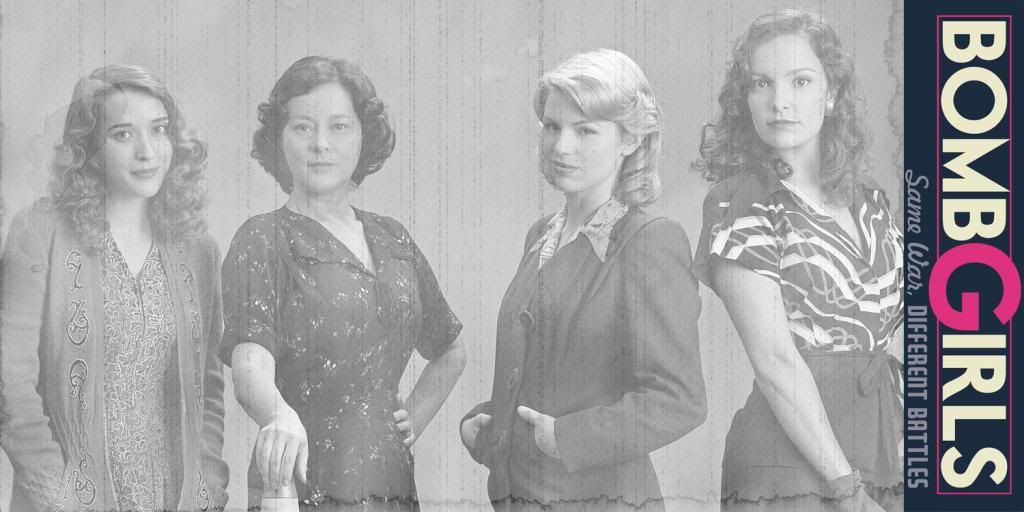

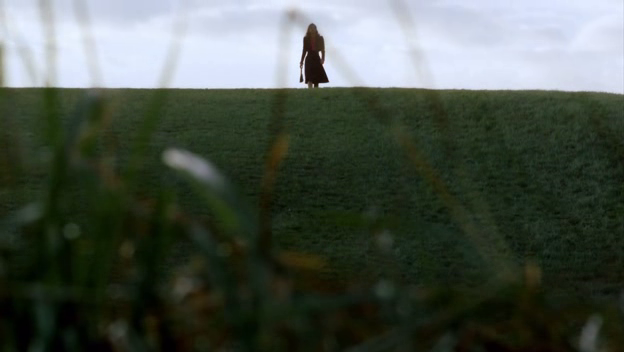
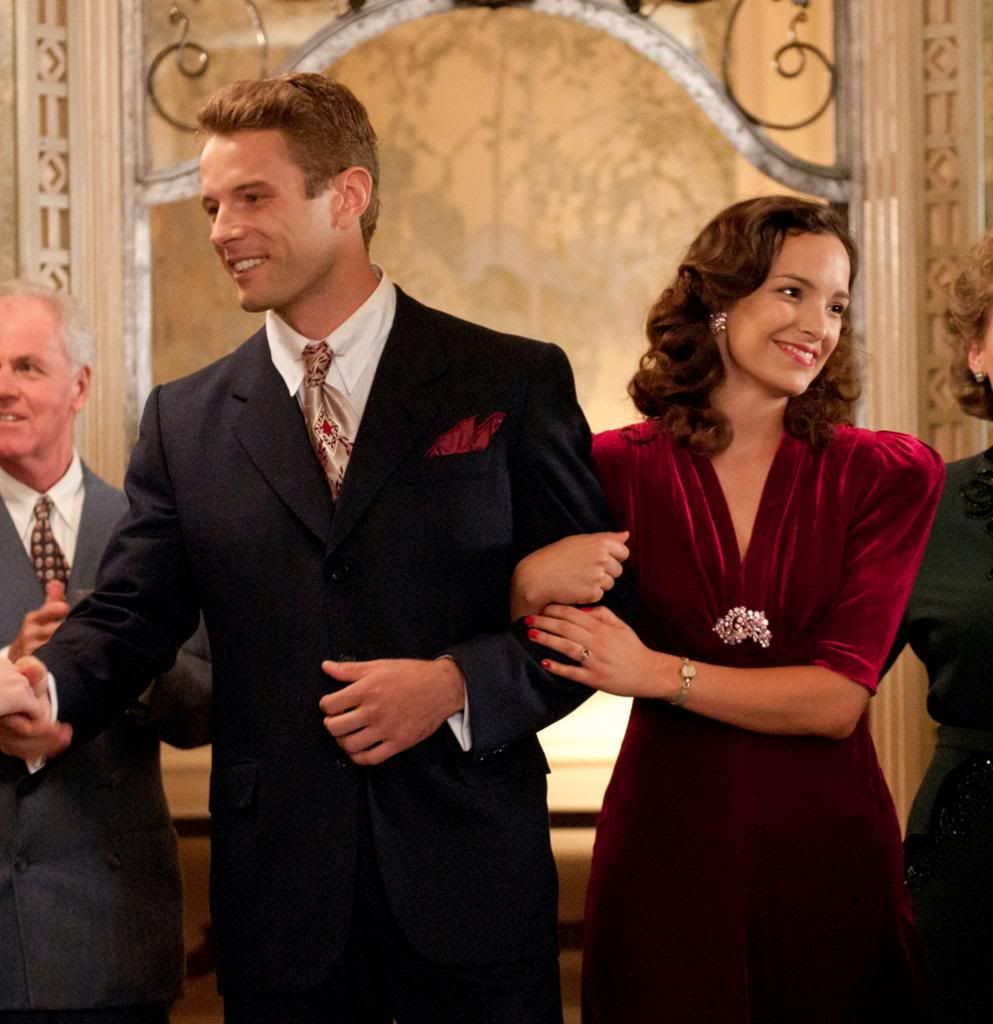
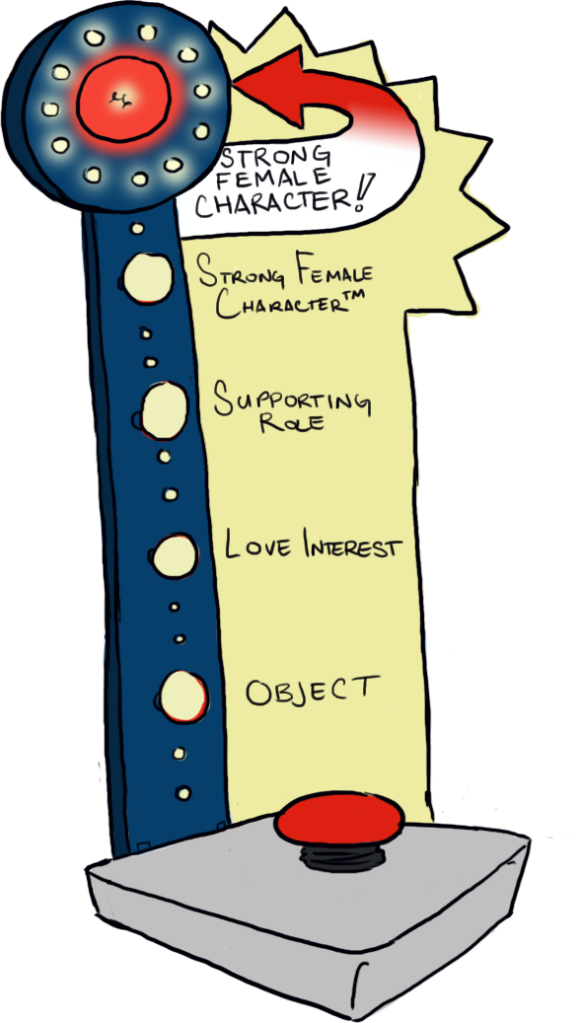
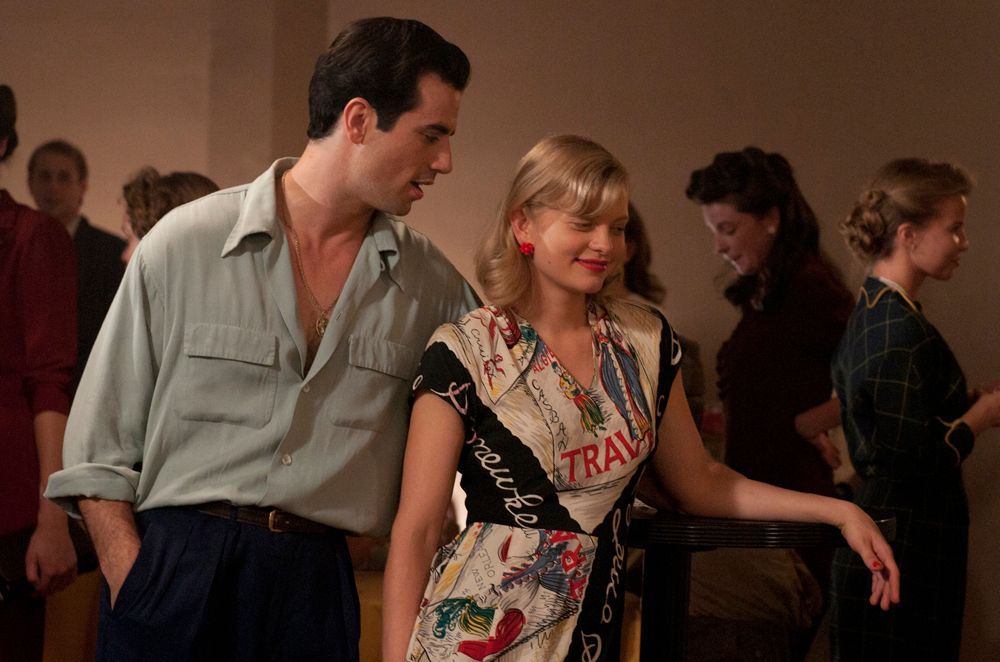

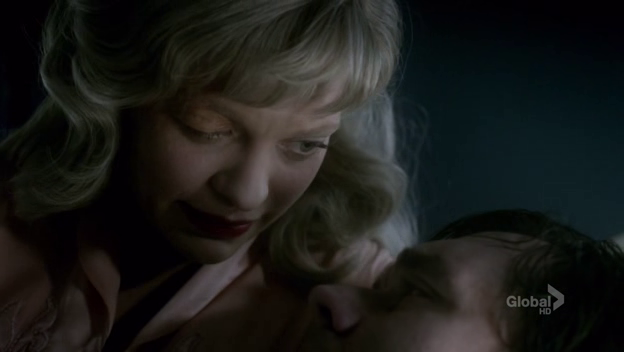
No comments:
Post a Comment